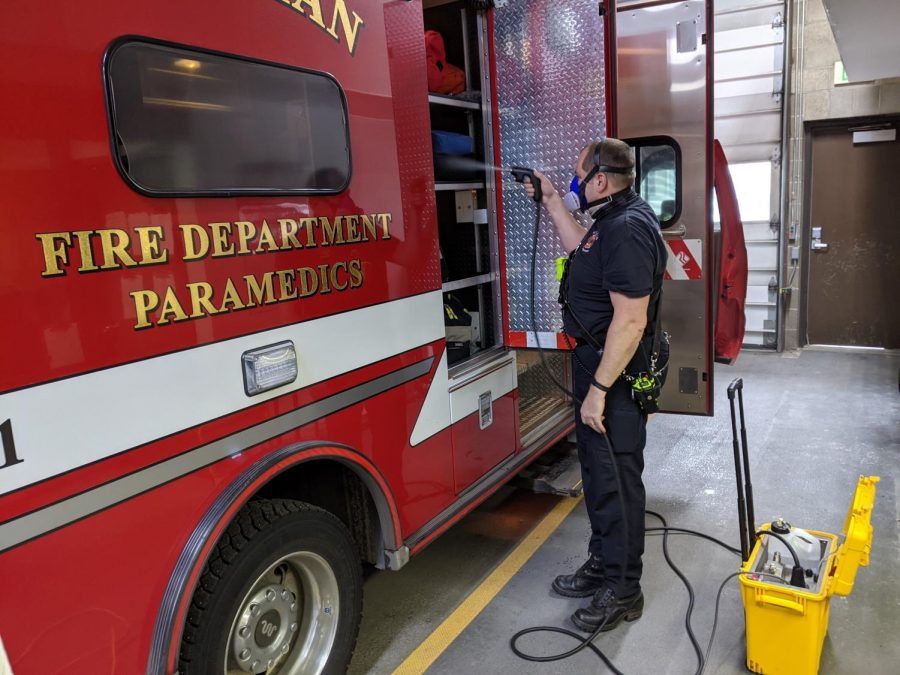First responders feel ‘wear and tear on morale’ during pandemic
Fire, police operations changed to include COVID-19 safety measures
The Pullman Fire Department has cleaning devices that sanitize vehicles after transporting patients who have or are suspected to have COVID-19. The department was able to get them through a COVID-19 grant.
February 11, 2021
As the U.S. approaches one year of COVID-19 pandemic guidelines, Pullman first responders have been trying to adjust to the new normal.
Several areas of operations have changed since last year, said Pullman Fire Chief Mike Heston.
This includes optional COVID-19 vaccinations, following pandemic protocols and closing the fire station to the public.
He said 60 percent of the fire department’s first responders have received the COVID-19 vaccine.
Close to half of the Pullman Police Department’s sworn-in staff have received it as well, said Pullman Police Chief Gary Jenkins. Getting vaccinated for COVID-19 is not mandatory for Pullman PD staff.
Jenkins and Heston said their teams are following strict cleaning and safety protocols — from wearing masks to social distancing during calls.
The fire department has cleaning devices that clean vehicles after transporting patients who have or are suspected to have COVID-19, Heston said. Each cleaning device costs around $18,000. The fire department was able to get them through a COVID-19 grant.
“We had not used them before this [pandemic], but it does a really thorough job,” he said. “We haven’t had any one member of our team get COVID from patients.”
Jenkins said the COVID-19 pandemic has changed Pullman PD’s daily operations, mainly in how officers respond to calls and participation in community events.
If calls do not need an officer to be physically present, Pullman PD will respond to those over the phone, he said. The department also allows emergency medical technicians to respond to medical calls first unless the matter is urgent. EMT responders must now wear medical gowns when going into calls.
Prior to the pandemic, officers had opportunities to go and speak in classrooms and other events, which makes them feel connected to the community, Jenkins said.
“Curtailing those public interactions where we have a positive response from the community, combined with the negative attention on law enforcement last year, has really affected officer morale,” he said.
Closing the fire station to the public has been really hard on morale, Heston said. Shifts are 24 hours. Oftentimes families would come in to have dinner with staff, but now the station keeps its doors closed to the public.
“If somebody gets exposed and goes home not realizing it, they exposed their families too, so that’s been stressful,” he said.
Dressing up for calls takes more time because first responders are required to wear extra protective gear, Heston said. If somebody gets exposed during a call, they have to go through a specific procedure to ensure everyone’s safety.
“That takes a toll, a wear and tear on morale, for sure,” he said.
Travel restrictions during the pandemic have affected the city’s budget as well, Heston said. This led to budget cuts in 2020 for the fire and police departments.
“We had to cut a lot of equipment that we were going to purchase and a lot of our extra training had been canceled,” Jenkins said. “Some of the equipment included internal training tools like virtual firearm training.”
Enforcing the nuisance party ordinance and issuing infractions is the biggest stressor for the police department, he said. Doing this puts the department in a difficult position. Students are gathering at parties that can quickly turn into COVID-19 spreader events.
“It is part of our responsibility now and we want to do our part to get the community back to normal as soon as possible,” Jenkins said. “But it adds more stress having to come into contact with people.”









